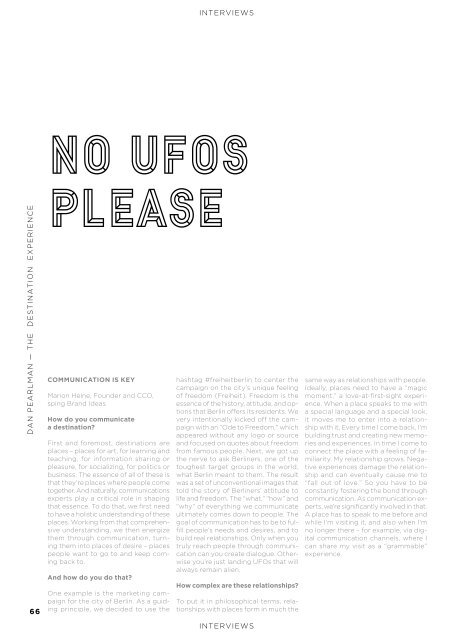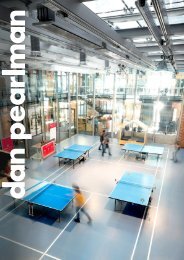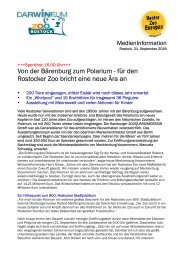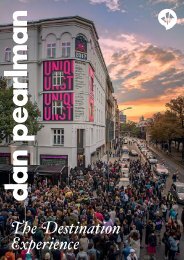The Destination Experience_dan pearlman
Sie wollen auch ein ePaper? Erhöhen Sie die Reichweite Ihrer Titel.
YUMPU macht aus Druck-PDFs automatisch weboptimierte ePaper, die Google liebt.
INTERVIEWS<br />
INTERVIEWS<br />
DAN PEARLMAN — THE DESTINATION EXPERIENCE<br />
66<br />
No Ufos<br />
please<br />
COMMUNICATION IS KEY<br />
Marion Heine, Founder and CCO,<br />
sping Brand Ideas<br />
How do you communicate<br />
a destination?<br />
First and foremost, destinations are<br />
places – places for art, for learning and<br />
teaching, for information sharing or<br />
pleasure, for socializing, for politics or<br />
business. <strong>The</strong> essence of all of these is<br />
that they’re places where people come<br />
together. And naturally, communications<br />
experts play a critical role in shaping<br />
that essence. To do that, we first need<br />
to have a holistic understanding of these<br />
places. Working from that comprehensive<br />
understanding, we then energize<br />
them through communication, turning<br />
them into places of desire – places<br />
people want to go to and keep coming<br />
back to.<br />
And how do you do that?<br />
One example is the marketing campaign<br />
for the city of Berlin. As a guiding<br />
principle, we decided to use the<br />
hashtag #freiheitberlin to center the<br />
campaign on the city’s unique feeling<br />
of freedom (Freiheit). Freedom is the<br />
essence of the history, attitude, and options<br />
that Berlin offers its residents. We<br />
very intentionally kicked off the campaign<br />
with an “Ode to Freedom,” which<br />
appeared without any logo or source<br />
and focused on quotes about freedom<br />
from famous people. Next, we got up<br />
the nerve to ask Berliners, one of the<br />
toughest target groups in the world,<br />
what Berlin meant to them. <strong>The</strong> result<br />
was a set of unconventional images that<br />
told the story of Berliners’ attitude to<br />
life and freedom. <strong>The</strong> “what,” “how” and<br />
“why” of everything we communicate<br />
ultimately comes down to people. <strong>The</strong><br />
goal of communication has to be to fulfill<br />
people’s needs and desires, and to<br />
build real relationships. Only when you<br />
truly reach people through communication<br />
can you create dialogue. Otherwise<br />
you’re just landing UFOs that will<br />
always remain alien.<br />
How complex are these relationships?<br />
To put it in philosophical terms, relationships<br />
with places form in much the<br />
same way as relationships with people.<br />
Ideally, places need to have a “magic<br />
moment,” a love-at-first-sight experience.<br />
When a place speaks to me with<br />
a special language and a special look,<br />
it moves me to enter into a relationship<br />
with it. Every time I come back, I’m<br />
building trust and creating new memories<br />
and experiences. In time I come to<br />
connect the place with a feeling of familiarity.<br />
My relationship grows. Negative<br />
experiences damage the relationship<br />
and can eventually cause me to<br />
“fall out of love.” So you have to be<br />
constantly fostering the bond through<br />
communication. As communication experts,<br />
we’re significantly involved in that.<br />
A place has to speak to me before and<br />
while I’m visiting it, and also when I’m<br />
no longer there – for example, via digital<br />
communication channels, where I<br />
can share my visit as a “grammable”<br />
experience.<br />
DAN PEARLMAN — THE DESTINATION EXPERIENCE<br />
67<br />
INTERVIEWS<br />
INTERVIEWS

















